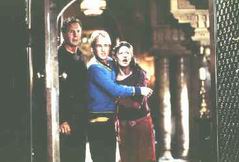The Haunting
Watching the remake of “The Haunting” is the equivalent of going to a Halloween party you’ve really been looking forward to only to find out that the turd in the punch bowl is real. Forget things that go bump in the night, be afraid of things that go dump in the night.
This film stinks so bad it’s funny, but not funny in a ha-ha way. The performances and dialogue are so lame they inspire laughter. Too bad “The Haunting” isn’t a comedy. After “Speed 2” and this film, director Jan De Bont will be lucky if he can get a job shooting Hansen music videos.
 De Bont and writer David Self obviously believe that bigger is better. They forget that the original film version of “The Haunting” (based on Shirley Jackson’s truly terrifying “The Haunting of Hill House”) worked so well because of what the audience didn’t see. Director Robert Wise created mood and suspense through insinuation and shadows.
De Bont and writer David Self obviously believe that bigger is better. They forget that the original film version of “The Haunting” (based on Shirley Jackson’s truly terrifying “The Haunting of Hill House”) worked so well because of what the audience didn’t see. Director Robert Wise created mood and suspense through insinuation and shadows.
De Bont is one of those in-your-face directors who doesn’t trust modern, jaded audiences to sit through a ghost story without giving up the ghost. Perhaps De Bont should sit through “The Blair Witch Project.” In dealing with matters of the supernatural, it helps to keep the audience in the dark as much as the characters on the screen.
It also helps to have a director capable of drawing out believable performances from his cast. Both “Ghost” and “Poltergeist” worked so well because their respective directors understood that for the fantasy to be taken seriously, the characters experiencing it must be believable. People don’t act in De Bont films, they over act.
You can hardly blame the performers. They’re forced to chew scenery because there is nothing else to feast on. Self’s screenplay is a wasteland of cliches and predictability, while De Bont seems more interested in showing off production designer Eugenio Zanetti’s remarkable sets. The actors are left to fend for themselves, so their over reactions are more a survival instinct than a creative decision.
Maybe “The Haunting” was the film star Liam Neeson was working on when he gave that interview where he said he wanted to quit working in movies. I imagine after two months of working on the film Neeson probably thought his career would be over anyway. Might as well beat the critics to the punch.
You feel sorry for Neeson because he is such a good actor trapped in such a nothing role. He plays Dr. David Marrow, a psychologist doing a study on fear. In order to keep his study a secret, Dr. Marrow claims to his subjects that he is doing a study on sleep disorders.
His study attracts three subjects, including the mousey Eleanor (call her Nell), a thirty-something woman who has spent her entire life taking care of a sick mother. Now that her mother has died, Nell (Lili Taylor) finally has her life back, but can’t escape her mother’s presence.
Theo (Catherine Zeta-Jones) is the most spirited of the group, a bisexual (the reference is made and then instantly dropped) woman who hasn’t had a decent nights sleep in her life. Then there is Luke Sanderson (Owen Wilson), a handsome young pup who is totally stoked to be in the group.
Of course none of the group can understand why Marrow would choose the distant and cavernous Hill House mansion to conduct a sleep disorder study, including the mansion’s handyman (Bruce Dern) and housekeeper (Marian Seldes).
It doesn’t take long before the participants learn the truth about their participation, or for the house to come monstrously to life. Marrow tries to convince them that it’s all part of the study, but when the supernatural events start becoming malevolent, it’s every man and woman for themselves.
De Bont’s major misstep is his insistence to put everything up on the screen. Nothing is left to the imagination. You could close your eyes and describe the action on the screen with little or no problem. Unfortunately, the images in your mind would be far more horrific than those on the screen.
You have to admire the technical aspects of the film. The production design is incredible, with some of the biggest sets I have ever seen in a film. They are truly cavernous, giving the film a depth of field that is uncommon. However, De Bont unfairly exploits the production design, telegraphing several ghostly effects to come later.
The music by Jerry Goldsmith is also a plus, a creepy blend of sounds designed to put you on edge. They do.
You just wish the performances, both flesh and computer generated, were as effective. Neeson looks tired and confused, while poor Lili Taylor, the queen of the Independent film circuit, is relegated to looking lost most of the time. Zeta-Jones looks lovely, but the leather outfit she wears has more layers than her character. Wilson looks like he would rather be surfing.
The only decent performance in the film belongs to the great character actress Marian Seldes, but she is forced to utter the expected warning about the house, and you have to wonder if they had to inject novocaine in her cheeks so she could keep a straight face.
A good ghost story should both intrigue and scare you. A great ghost story should make the hair on the back of your neck. The remake of “The Haunting” does neither. You shake your head in disbelief at wonder how so much money can buy so little.
